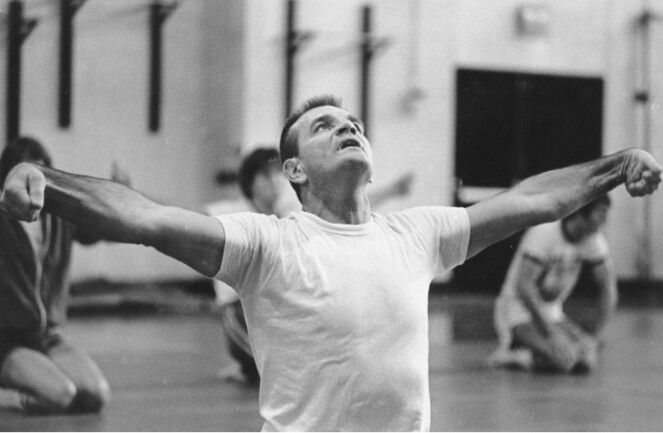Rudy Bachna: a gymnastics pioneer
March 13, 2021
Rudy Bachna was a legend in the world of gymnastics and an icon in the Slovakian community in northeast Ohio. He died on Feb. 20, 2021, at the age of 92.
He was born in Cleveland in 1928 and lived in the northeast Ohio area his whole life.
A childhood accident left him missing a few fingers on one hand, which hurt his chances of having a competitive playing career in gymnastics. That accident didn’t stop him from becoming an international ambassador for the sport, a judge and a legendary instructor of the game.
Bachna earned a bachelor’s and a master’s degree from Kent State before returning to teach at the university. He taught physical education classes, Czechoslovakian language classes and folk dancing classes for many years.
Bachna co-founded KSU’s men’s and women’s gymnastics teams in 1959, along with his brother, Joe and his wife, Janet. He coached the men’s gymnastics team from its inception until 1978. He remained as coach of the women’s team until he retired from coaching gymnastics in 1991. He also coached the men’s soccer team from 1963-1972.
Bachna impacted the gymnastics world at all levels over his 32 year career. He oversaw the collegiate careers of two Olympic athletes, Betty Maycock and Marie Walther. He would serve as a judge at four Olympics, three Pan-American Games and two World Championships.
Bachna did not ignore younger gymnasts though. He created the Children’s Gymnastics Program and the “Gymnastics in Motion” program that attracted thousands of fans to attend.
Bachna guided the women’s team to four Mid-American Conference championships and four consecutive state championships from 1975-78. He was honored with the Service Excellence Award by Ohio USA Gymnastics in 2012.
“I say that I am alive because of Rudy,” former KSU gymnast Shannon Simmons said. “If my parents never got recruited to Kent State then I may have never been born.”
Simmons’ parents were both gymnasts at KSU, who were coached by Bachna. She grew up calling him “Uncle Rudy.”
When Simmons’ father qualified for the Olympic trials in 1968, Bachna drove him to Oklahoma City and paid his fees so he could compete. She said Bachna wanted his athletes to maximize their talents and he was more than willing to spend his own money to ensure that they got the chances to do so.
Simmons was never coached by Bachna herself, as he retired before she started at Kent State in 1993. She said even after he retired, he was still very involved with the KSU gymnastics programs. Bachna rarely missed a home meet and was a regular at Kent sporting events of all types.
“I always say he invented the sport of gymnastics,” Simmons said. “He did so much for the sport and not just at the collegiate level.”
Bachna was more than just a legendary gymnastics coach. He was a mentor and sometimes even a father figure for several of his athletes, one of them being current KSU women’s gymnastics coach Brice Biggin, who played under him and was an assistant coach that would eventually become his successor.
Biggin said he would have regular dinners with Rudy for years after he took over the reigns of the women’s program and they would discuss their lives and occasionally hash out a game plan, if there was a meet the following day.
“He expected a lot from you,” Biggin said. “The biggest thing he taught me was accountability. He showed me that you have to work hard to be successful.”
Bachna and his wife would routinely offer their home to anyone who may have needed a place to stay. Those close to him say he was determined to help people with whatever they needed, whether that was instruction regarding technique on a floor routine or life advice on how to deal with a partner. He helped jumpstart the careers of numerous coaches. He organized reunions decades after their playing days with former players.
Bachna was also a cultural icon. He was proud of his roots and he did not hesitate to show it. He was an active participant in community social events. He made the Kent-Dudince Sister Cities Association that promoted the history and heritage of the Slovak culture. He was well-known throughout the Slovak community in Cleveland and other parts of northeast Ohio.
“He was passionate about his heritage and his relationships with everyone,” KSU’s long-time PA announcer Jeff Kurtz said. Kurtz first met Rudy while he was an undergraduate student, and they became close friends over the next 30 years.
The day after Bachna died, the gymnastics team had a meet against the University of Central Michigan. The Flashes held a tribute for him and they ended up scoring the most points they had in a meet in over three years.
“For them to put on that showing under these circumstances, it just means so much to the program and our alumni,” Biggin said after that emotional meet.
Rudy touched the lives of so many of his athletes and nearly every person he talked to or knew has a great story to tell about him.
“He was one of the pioneers of collegiate gymnastics,” Biggin said. “He was certainly a trailblazer in this world. He will be missed.”
Charitable contributions in Rudy’s memory can be made to the Kent State women’s gymnastics team at https://flashes.givetokent.org/campaign/kent-state-gymnastics/c327601.
Sean is a sports reporter. Contact him at [email protected].












